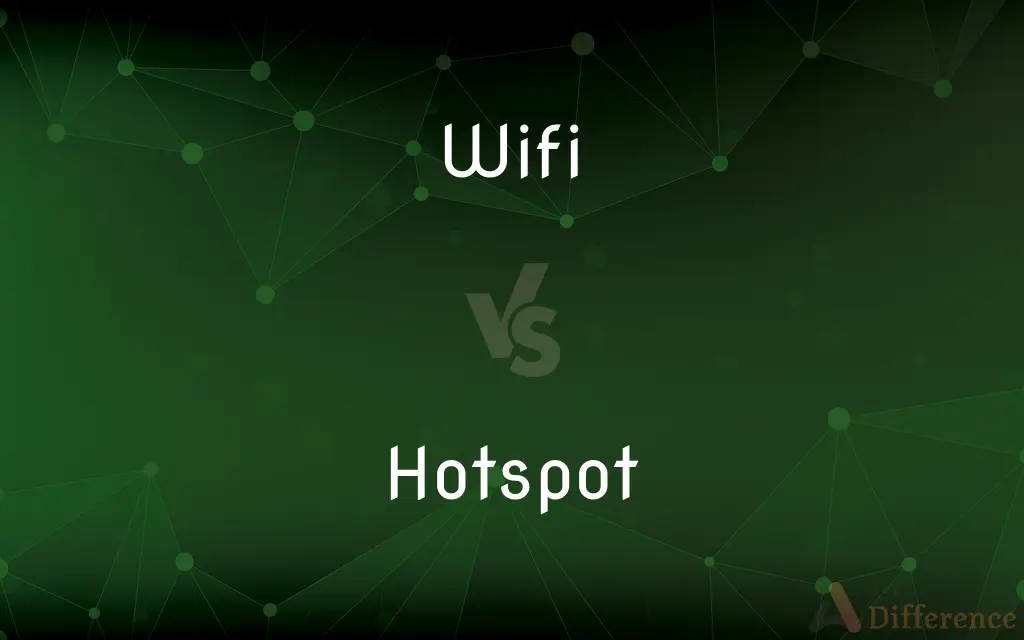Wifi vs. Hotspot — What's the Difference?
Edited by Tayyaba Rehman — By Fiza Rafique — Updated on April 15, 2024
Wifi is a wireless networking technology that provides internet access within a certain range, using a router. Hotspot refers to a physical location where Wifi is available, often provided by a mobile device.

Difference Between Wifi and Hotspot
Table of Contents
ADVERTISEMENT
Key Differences
Wifi technology creates a wireless network using a router, allowing multiple devices to connect to the internet simultaneously within a certain range. Whereas, a hotspot typically refers to a physical location where Wifi access is available to the public or privately, such as in cafes or through a mobile device acting as a portable Wifi provider.
Wifi networks are generally intended for broader and more permanent internet access setups, such as in homes or offices. On the other hand, hotspots are often temporary, set up to provide internet access where a traditional Wifi network might not be available, like during travel or in outdoor settings.
The security of a Wifi network usually involves encrypted connections managed through a router with security protocols like WPA2. In contrast, hotspots can be less secure, especially public ones, because they are open to a wider array of users and potentially susceptible to breaches.
Wifi setups typically offer higher speeds and more stable connections because they are connected to a dedicated internet service. Hotspots, however, may offer slower speeds or limited bandwidth because they often rely on cellular network connections, which can fluctuate based on location and network traffic.
The cost of using Wifi is generally absorbed in monthly internet service payments or is part of the utility costs of a business. Meanwhile, using a hotspot might incur additional charges, particularly if the hotspot uses a mobile service provider’s data plan, which might limit the amount of data available.
ADVERTISEMENT
Comparison Chart
Definition
Technology for wireless networking
Physical location with Wifi access
Use Case
Permanent setups (home, office)
Temporary or mobile situations
Security
High, with encryption
Varies, often lower especially in public spaces
Speed and Stability
Generally high and stable
Can be variable, often dependent on mobile network
Cost
Monthly fees or built into business utilities
Can include extra charges for mobile data usage
Compare with Definitions
Wifi
Technology allowing electronic devices to connect to a wireless LAN (WLAN) network.
Most modern homes have Wifi networks for convenient internet access.
Hotspot
A site that offers Internet access over a wireless local area network.
The cafe offers a hotspot for customers to browse the internet.
Wifi
Can connect multiple devices simultaneously.
Their Wifi network can support up to 20 devices at once.
Hotspot
Often utilizes a router connected to an internet service provider.
Hotspots in airports help passengers connect to the web while waiting.
Wifi
A network that does not require any physical connections to send and receive data.
Our office switched to Wifi to eliminate the clutter of cables.
Hotspot
Can be public or private, often requiring a password.
Many hotspots require a password that the establishment provides.
Wifi
Provides internet access by broadcasting frequencies from a router.
The Wifi at the library uses a dual-band router for better performance.
Hotspot
Powered by Wifi technology but distinct in usage and setup.
Setting up a hotspot involves configuring a device to provide Wifi access.
Wifi
Often secured with passwords and encryption protocols.
Always ensure your Wifi has a strong password to prevent unauthorized access.
Hotspot
Usually has a range limit, similar to standard Wifi.
The hotspot's range is sufficient for the coffee shop's seating area.
Wifi
Alternative form of Wi-Fi
Hotspot
An area in which there is dangerous unrest or hostile action
"opportunities ... for United Nations forces to play a constructive role in some of the world's hot spots" (Paul Lewis).
Wifi
Alternative form of Wi-Fi
Hotspot
(Informal) A lively and popular place, such as a nightclub.
Wifi
A local area network that uses high frequency radio signals to transmit and receive data over distances of a few hundred feet; uses ethernet protocol
Hotspot
An area of intense heat, radiation, or activity.
Hotspot
A location where Wi-Fi is publicly available.
Hotspot
Alternative form of hot spot
Hotspot
A place of political unrest and potential violence;
The United States cannot police all of the world's hot spots
Hotspot
A point of intense heat or radiation
Hotspot
A lively entertainment spot
Common Curiosities
Can I set up a hotspot using my smartphone?
Yes, most smartphones can be configured to act as a hotspot, sharing their cellular data connection.
How do I connect to a Wifi network?
Connect by selecting the network from your device’s Wifi settings and entering the password, if required.
What makes a hotspot different from regular Wifi?
A hotspot specifically refers to a location offering Wifi access, often temporarily or in public spaces.
Can I improve my hotspot's security?
Yes, by changing the default password and using security features like encryption.
Are hotspots reliable for work purposes?
While convenient, hotspots might not offer the same reliability as a home or office Wifi network, especially for high-bandwidth activities.
What is a Wifi hotspot device?
A portable device that transmits a Wifi signal, often using a cellular data connection, to provide internet access on the go.
What is the maximum range of a typical Wifi network?
A typical Wifi network can cover from 150 to 300 feet, depending on obstructions and router power.
What is Wifi used for?
Wifi is used for providing wireless internet access in fixed locations like homes and businesses.
Is Wifi more secure than a hotspot?
Generally, Wifi networks can be more secure due to controlled access settings and encryption protocols.
What are the typical costs associated with using a hotspot?
Costs can vary, especially if the hotspot uses mobile data, which might incur charges based on data usage.
What speeds can I expect from a hotspot?
Speeds can vary, generally slower than a dedicated Wifi connection, dependent on the mobile network’s strength.
How many devices can connect to a hotspot at once?
This can vary based on the device providing the hotspot but is generally fewer than a home router.
Is there a difference in data usage between Wifi and hotspots?
Yes, using a hotspot typically consumes data from a cellular plan, while Wifi usage generally does not impact mobile data limits.
Do all cafes and hotels offer hotspots?
Many do, but availability can vary, so it's best to check beforehand.
Can hotspots work without electricity?
Mobile device-based hotspots can work without direct electricity since they run on battery power, but standalone hotspot devices generally need a power source.
Share Your Discovery

Previous Comparison
Hanukkah vs. Christmas
Next Comparison
Producer vs. ConsumerAuthor Spotlight
Written by
Fiza RafiqueFiza Rafique is a skilled content writer at AskDifference.com, where she meticulously refines and enhances written pieces. Drawing from her vast editorial expertise, Fiza ensures clarity, accuracy, and precision in every article. Passionate about language, she continually seeks to elevate the quality of content for readers worldwide.
Edited by
Tayyaba RehmanTayyaba Rehman is a distinguished writer, currently serving as a primary contributor to askdifference.com. As a researcher in semantics and etymology, Tayyaba's passion for the complexity of languages and their distinctions has found a perfect home on the platform. Tayyaba delves into the intricacies of language, distinguishing between commonly confused words and phrases, thereby providing clarity for readers worldwide.
















































